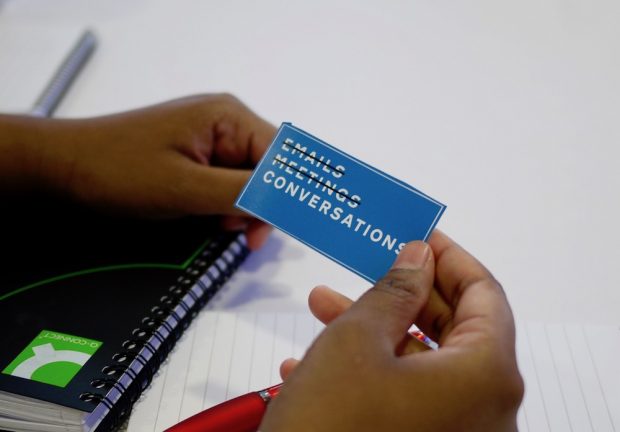
I want to talk about the subtle shift in communication approach within teams.
Effective digital teams are good at trust and openness. It takes time to build behaviours like these, but I think they’re essential if you want your team to do good work. They’re fragile, too: trust, in particular, is very difficult to build and easy to break. But they help teams play nicely together, especially when there’s pressure to deliver quickly.
Key to building trust and openness is a subtle shift in the way teams communicate.
Trust and openness improve and grow when there’s more real-time communication. Agile teams are more likely to talk - preferably face to face, but failing that using either phones or video calls. More talking means less emailing, and I believe that’s a good thing. Email can be impersonal, sometimes even misinterpreted. Endless email checking is miserable for everyone, and takes its toll on productivity and morale. The more email we send, the less coherent our work as a team, and the more often we miss deadlines because someone didn’t read an email in time.
Conversations cut confusion
Face-to-face conversation is much better at diffusing any tension or clearing up a misunderstanding. How many of us regularly email someone sat in the same room, or have been part of email chains that are misinterpreted, or have sent an email and not followed up? As Bob Hoskins once said, "It’s good to talk."
In Defra we are not always sat in the same room so face-to-face conversations are often difficult, but as I say: we have phones and can use video calls. The team I lead (Enabling Digital Transformation, also known as EDT) uses free services like appear.in all the time.
We have all used Microsoft Messenger or similar tools for quick chats. They’re good for individual one-to-one or group conversations. New tools, such as Slack, are better for team collaboration, maintaining history of conversations, and sharing learning. Slack has great traction in digital delivery teams across government, and is a wonderful tool, but we have to be careful with it - we can’t use it for anything sensitive.
Whatever tools we use, the change I think we need is a change of attitude. Conversation is quicker, simpler, and achieves more, no matter how it happens (via messaging app, phone call, or video call).
One last thing: I’m not saying email is dead. It has a place. It’s good for tracing discussions and decisions. It’s good for contacting new people outside your team, or even outside government. Email is definitely a useful tool, but we shouldn’t rely on it as our only tool. If we want more trust and more openness, we need to take Bob’s advice, and talk more.

4 comments
Comment by Charles Roper posted on
It's all about the Oxytocin. Have a look at this section of Simon Sinek's brilliantly inspiring Leaders Eat Last talk for an explanation of why this advice works: https://youtu.be/ReRcHdeUG9Y?t=27m33s
(The whole thing is great and well worth watching)
Comment by Paul posted on
Talking is vital to transforming the way we work - however email serves many purposes, one element is documentation. Whilst talking is quicker and easier it is not always recorded or documented, email or other collaboration tools allows you document the conversations for future use.
Comment by P. Vandenberghe posted on
I concur. As for Slack, however ... do read https://blog.doist.com/why-were-betting-against-real-time-team-messaging-521804a3da09 ... (There are other ways than the ones mentioned in the article, e.g. I know of a company that uses Confluence & Jira combined to allow for conversations in project files.)
Comment by Stephen Brown posted on
Isn't it all about using the right type of media...be that a face to face; video chat; messenger; phone; e-mail etc....for the situation that you are in or the information you need to share or gather or just work on. In one situation, say a team update if progress and highlights an e-mail might be right. To check a fact a phone call or messenger might be right. To get a new team working together a face to face might be the way to go. Choose the right tool for the job you have to do. You wouldn't choose scissors to cut your grass or a lawnmower to do your hair.